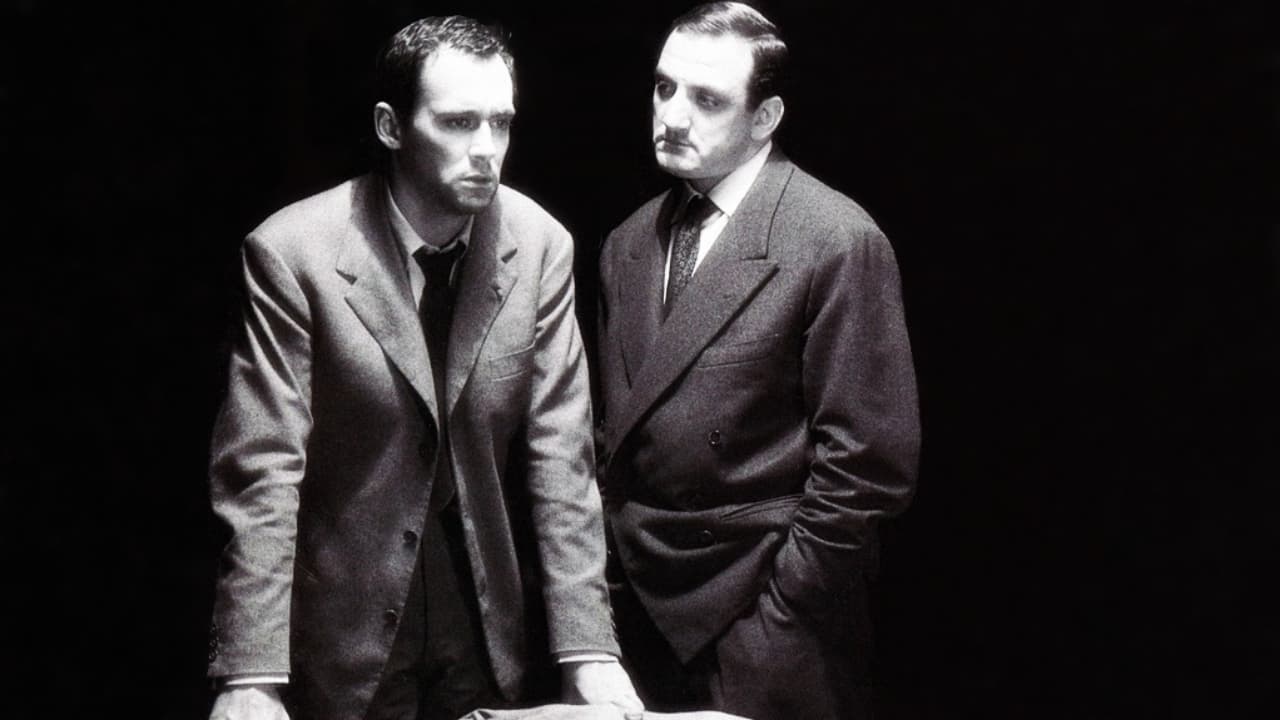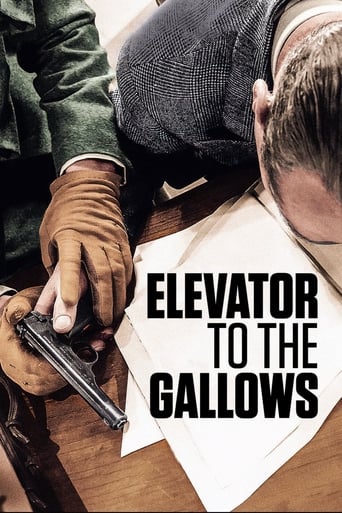



It's an amazing and heartbreaking story.
This is a dark and sometimes deeply uncomfortable drama
View MoreA terrific literary drama and character piece that shows how the process of creating art can be seen differently by those doing it and those looking at it from the outside.
View MoreA clunky actioner with a handful of cool moments.
What a horrible story and extremely awkward predicament! He commits the absolutely most perfect murder imaginable, and then a telephone call makes him forget one detail, and when he tries to remedy his mistake he is caught in an elevator between two storeys and can't get out! And that's only the introductory plot to a web of plots or rather an inextricable mess of misfortunes...There are altogether four criminals and three murders committed, only one planned and three just slipping into it by circumstances. Jeanne Moreau is always perfect in wicked roles, there is a certain trait around her mouth which makes her hopelessly and incurably look cruel, her laugh is never convincing, and she has no sense of humour. That'¨s what's generally lacking in French films, which is why they are best at making sinister films, like this one, "Les yeux sans visage", "Les diaboliques" and other hopelessly dark thrillers, of which this is another one and definitely one of the very best in its grey tristesse and filmed almost exclusively in sterile surroundings - that's the dominant character of almost all French films of the Nouvelle Vague, which makes them slightly inhuman. This is more human, since it's a crime passionnel it's all about, and the youths are just humanly stupid and actually try to commit suicide for their offence.Maurice Ronet is always expressionless and here more than ever - a total poker face, having nothing else to do but to submit to his bleak destiny - not even the smartest murder in the world could save him here.Miles Davis' dark jazz underscores the défaitism of the thriller by being mostly silent but for some poignant reminders to add some acuteness to the dreary mood. It's a brilliant film, the first of many by Louis Malle, most of them equally hopeless, like the dreadful suicide study "Le feu follet"(also with Maurice Ronet), but this is only his second best film. His best film remains his very odd and different collaboration with Jacques-Yves Costeau in "The Silent World", which is also his most human film.
View MoreLouis Malle is telling a simple story: when committing a crime like murder don't make easy mistakes since this will give space to unforeseeable events and justice will prevail. Some parts of the story may seem a bit overdone in order to demonstrate the unpredictability of other actors involved but on the other hand the movie hardly ever loses its style and it's this style that excels. When beautiful Jeanne Moreau, in her despair of supposed betrayed love, is walking alone the nightly streets of Paris accompanied by the fine jazz tunes of Miles Davis then it feels like contemplating a valuable piece of art.It is also true that the side story of the young couple borrowing the car of Mr. Tavernier is a bit awkward and not too persuasive but on the other hand the play of young flower-girl Veronique is really impressive. What an outgoing and enthusiastic but weak and shy character at the same time. I am sure even today's teenagers could relate to her.Moreover, the movie is not simply a crime story but also has its social and political statements. The victim of the planned murder (next to an unplanned murder) is an unscrupulous arms-dealer who has his connections into the highest political ranks. This does not provide a favorable picture of a post war France, which is even worsened by the submissive and hypocritical behavior that great parts of society show towards this influential man. Only drunkard Mr. Subervie is naming him the right way and by doing so he even stresses the hypocrisy surrounding him.Last but not least Lino Ventura gives a cool and pragmatic detective, a role he should become famous for in his career. The police questioning scene in the dark with the two detectives interrogating Maurice Ronnet for a crime he has not committed is another highlight of the movie.
View MoreIntriguing policier with a very off-beat plot and a neat little reminder about the best-laid plans of mice and men. As much as we may think that we can plan our lives, a simple little thing -- say, taking an elevator, or leaving a camera in one's car -- may turn out to have life-or-death consequences. I found it quite interesting that the two romantic leads, Mrs. Carala (Jeanne Moreau) and Tavernier (Maurice Ronet), spend the entire length of the film apart.I think the movie falters toward its end, when Mrs. Carala turns detective and the police case falls too neatly into place. However, I enjoyed the little steps of the cat-and-mouse game.The younger, all-too-ordinary, unintelligent lovers' antics, and the way their lives go down the tubes in a heartbeat, is fascinating to watch and, sadly, not that hard to believe.This was a fun, if not totally coherent, highly atmospheric viewing experience. It kept my attention thoroughly.
View MoreBoasting a jazz score by the legendary Miles Davis, Louis Malle's "Elevator to the Gallows" is a moody film noir starring Maurice Ronet as Julien Tavernier, an office worker who murders a wealthy industrialist. Why? To be with the victim's wife of course.This is a plot typical of film noirs. What complicates the film is this: the victim is a war criminal who profited off France's many colonialist occupations (specifically in Algeria and Indochina). Julien, meanwhile, is a war hero and former parachutist who sees his kill as a form of poetic justice. This is a noir, however, and so Julien's best laid plans swiftly go awry. Pretty soon he finds himself trapped in an elevator and so caged at the very site of his crime. His predicament is inter-cut with the adventures of two kids in love, Louis and Veronica, who steal Julien's car and assume his identity. With this stollen identity comes another crime: the duo shoot to death two German tourists. To exonerate himself of the duo's crime, Julien must thus implicate himself in his own crime. Where are the police in all of this? Confused as hell.Malle then engages in another, largely symbolic sub-plot. Here Julien represents the men of the inter-war years, idealised, mythologised and touted as noble heroes. Louis, meanwhile, becomes indicative of post-war youths, living in the shadow of the War and envious of the nationally recognised achievements of those who came before. To assuage such feelings, Louis assumes Julien's identity and unconsciously becomes a WW2 soldier, and even goes so far as to kill two Germans on French soil with Julien's pistol. It's not only that Louis eventually realises what the sanctified image of Julien really represents, like Julien's own realisations with regard to his boss, but that both Julien and Louis find themselves unable to stop killing. The war makes a murderer out of one, and forces the other to kill out of fear of exclusion."Elevator to the Gallows" co-stars Jeanne Moreau, who famously acted in Truffaut's "Jules and Jim". Its moody, noirish cinematography was by Henri Decae, who turns elevators into prisons and city streets into hypnotic shadow-worlds (Decae also shot Melville's "Bob the Gambler" and "The Samurai").7.9/10 - One of Malle's best. See too Renoir's "La Bête Humaine" ("The Human Beast"), arguably the first French noir.
View More